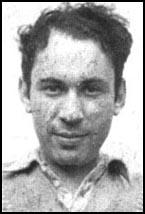Harold Clurman

Harold Clurman was was born in New York City on 18th September, 1901. After studying at Columbia University and the University of Paris he returned to the United States where became involved working with the Greenwich Theatre.
In 1931 he joined with Lee Strasberg to form the Group Theatre in New York. Others involved in the group included Elia Kazan, John Garfield, Howard Da Silva, Franchot Tone, John Randolph, Joseph Bromberg, Clifford Odets and Lee J. Cobb. Members of the group tended to hold left-wing political views and wanted to produce plays that dealt with important social issues.
The Group Theatre produced some notable plays including The House of Connelly (1931 by Paul Green), Condemned (1932 by Marc Blizstein), Men in White (1933 by Sidney Kingsley), Gentle Woman, (1933 by John Howard Lawson), Waiting for Lefty (1935 by Clifford Odets), The Cradle Will Rock (1937 by Marc Blizstein) and My Heart's in the Highlands (1939 by William Saroyan).
Clurman deeply influenced the work of Elia Kazan. He wrote: "I learned from Harold Clurman that a director's first task is to make his actors eager to play their parts. He had a unique way of talking to actors - I didn't have it and I never heard of another director who did; he turned them on with his intellect, his analyses and his insights. But also by his high spirits. Harold's work was joyous. He didn't hector his actors from an authoritarian position; he was a partner, not an overlord, in the struggle of production. He'd reveal to each actor at the onset a concept of his or her performance, one the actor could not have anticipated and could not have found on his own. Harold's visions were brilliant; actors were eager to realize them. They were also full of compassion for the characters' dilemmas, their failings and their aspirations."
The Group Theatre disbanded in 1941 and whereas most of the group moved to Hollywood, Clurman stayed behind and directed a series of important plays including Member of the Wedding (1950), Tiger at the Gates (1955), Touch of the Poet(1957) by Eugene O'Neill and After the Fall (1964) and Incident at Vichy (1965) by Arthur Miller.
Harold Clurman, who was also a drama critic for the New Republic (1948-52) and The Nation (1953-1980), died in New York on 9th September, 1980.
Primary Sources
(1) In his autobiography, Elia Kazan described Harold Clurman's method of directing.
I learned from Harold Clurman that a director's first task is to make his actors eager to play their parts. He had a unique way of talking to actors - I didn't have it and I never heard of another director who did; he turned them on with his intellect, his analyses and his insights. But also by his high spirits. Harold's work was joyous. He didn't hector his actors from an authoritarian position; he was a partner, not an overlord, in the struggle of production. He'd reveal to each actor at the onset a concept of his or her performance, one the actor could not have anticipated and could not have found on his own. Harold's visions were brilliant; actors were eager to realize them. They were also full of compassion for the characters' dilemmas, their failings and their aspirations.
